HP ProBook 430 G3 Maintenance and Service Guide

HP ProBook 430 G3 Notebook PC
Maintenance and Service Guide
© Copyright 2015 HP Development Company,
L.P.
AMD is a trademark of Advanced Micro Devices, Inc. Bluetooth is a trademark owned by its proprietor and used by HP Inc. under license. Intel, Celeron, and Pentium are trademarks of Intel Corporation in the U.S. and other countries. Microsoft and Windows are trademarks of the Microsoft group of companies.
The information contained herein is subject to change without notice. The only warranties for HP products and services are set forth in the express warranty statements accompanying such products and services. Nothing herein should be construed as constituting an additional warranty. HP shall not be liable for technical or editorial errors or omissions contained herein.
First Edition: September 2015
Document Part Number: 824551-001
Product notice
This user guide describes features that are common to most models. Some features may not be available on your computer.
Not all features are available in all editions of Windows. This computer may require upgraded and/or separately purchased hardware, drivers and/or software to take full advantage of Windows functionality. Go to http://www.microsoft.com for details.
Software terms
By installing, copying, downloading, or otherwise using any software product preinstalled on this computer, you agree to be bound by the terms of the HP End User License Agreement (EULA). If you do not accept these license terms, your sole remedy is to return the entire unused product (hardware and software) within 14 days for a full refund subject to the refund policy of your seller.
For any further information or to request a full refund of the price of the computer, please contact your seller.
This computer may require upgraded and/ or separately purchased hardware and/or a DVD drive to install the Windows 7 software and take full advantage of Windows 7 functionality. See http://windows.microsoft.com/en-us/ windows7/get-know-windows-7 for details.

Important Notice about Customer Self-Repair Parts
 CAUTION: Your computer includes Customer Self-Repair parts and parts that should only be accessed by an authorized service provider. See Chapter 5, "Removal and replacement procedures for Customer Self-Repair parts," for details. Accessing parts described in Chapter 6, "Removal and replacement procedures for Authorized Service Provider only parts," can damage the computer or void your warranty.
CAUTION: Your computer includes Customer Self-Repair parts and parts that should only be accessed by an authorized service provider. See Chapter 5, "Removal and replacement procedures for Customer Self-Repair parts," for details. Accessing parts described in Chapter 6, "Removal and replacement procedures for Authorized Service Provider only parts," can damage the computer or void your warranty.
iii
iv Important Notice about Customer Self-Repair Parts

Safety warning notice
 WARNING! To reduce the possibility of heat-related injuries or of overheating the computer, do not place the computer directly on your lap or obstruct the computer air vents. Use the computer only on a hard, flat surface. Do not allow another hard surface, such as an adjoining optional printer, or a soft surface, such as pillows or rugs or clothing, to block airflow. Also, do not allow the AC adapter to contact the skin or a soft surface, such as pillows or rugs or clothing, during operation. The computer and the AC adapter comply with the user-accessible surface temperature limits de ned by the International Standard for Safety of Information Technology Equipment (IEC 60950).
WARNING! To reduce the possibility of heat-related injuries or of overheating the computer, do not place the computer directly on your lap or obstruct the computer air vents. Use the computer only on a hard, flat surface. Do not allow another hard surface, such as an adjoining optional printer, or a soft surface, such as pillows or rugs or clothing, to block airflow. Also, do not allow the AC adapter to contact the skin or a soft surface, such as pillows or rugs or clothing, during operation. The computer and the AC adapter comply with the user-accessible surface temperature limits de ned by the International Standard for Safety of Information Technology Equipment (IEC 60950).
v
vi Safety warning notice

Table of contents
1 Product description ....................................................................................................................................... |
1 |
2 Components .................................................................................................................................................. |
6 |
Right ....................................................................................................................................................................... |
6 |
Left ......................................................................................................................................................................... |
7 |
Display .................................................................................................................................................................... |
9 |
Top ........................................................................................................................................................................ |
10 |
TouchPad ........................................................................................................................................... |
10 |
Lights ................................................................................................................................................. |
11 |
Buttons, speakers, and ngerprint reader ........................................................................................ |
12 |
Keys ................................................................................................................................................... |
14 |
Bottom ................................................................................................................................................................. |
15 |
Labels ................................................................................................................................................................... |
17 |
Inserting a SIM card (select products only) ......................................................................................................... |
18 |
3 Illustrated parts catalog .............................................................................................................................. |
19 |
Computer major components .............................................................................................................................. |
19 |
Display components ............................................................................................................................................ |
22 |
Cable Kit ............................................................................................................................................................... |
23 |
Mass storage devices ........................................................................................................................................... |
24 |
Plastics Kit ........................................................................................................................................................... |
25 |
Miscellaneous parts ............................................................................................................................................. |
25 |
4 Removal and replacement procedures preliminary requirements .................................................................... |
27 |
Tools required ...................................................................................................................................................... |
27 |
Service considerations ......................................................................................................................................... |
27 |
Plastic parts ....................................................................................................................................... |
27 |
Cables and connectors ...................................................................................................................... |
28 |
Drive handling ................................................................................................................................... |
28 |
Grounding guidelines ........................................................................................................................ |
29 |
Electrostatic discharge damage ..................................................................................... |
29 |
Packaging and transporting guidelines ....................................................... |
30 |
Workstation guidelines ................................................................................ |
30 |
Equipment guidelines ................................................................................... |
31 |
vii
5 Removal and replacement procedures for Customer Self-Repair parts ............................................................. |
32 |
Component replacement procedures .................................................................................................................. |
32 |
Battery ............................................................................................................................................... |
33 |
Service door ....................................................................................................................................... |
34 |
Hard drive .......................................................................................................................................... |
35 |
Memory modules ............................................................................................................................... |
37 |
WLAN/Bluetooth combo card ............................................................................................................ |
39 |
WWAN module ................................................................................................................................... |
41 |
M.2 solid-state drive ......................................................................................................................... |
43 |
Keyboard ........................................................................................................................................... |
44 |
6 Removal and replacement procedures for Authorized Service Provider parts ................................................... |
49 |
Component replacement procedures .................................................................................................................. |
49 |
Top cover ........................................................................................................................................... |
49 |
Fingerprint reader assembly ............................................................................................................. |
53 |
Power button board .......................................................................................................................... |
55 |
Function board .................................................................................................................................. |
57 |
USB/audio/card reader board ............................................................................................................ |
59 |
Fan ..................................................................................................................................................... |
61 |
Battery connector cable .................................................................................................................... |
63 |
System board .................................................................................................................................... |
64 |
RTC battery ........................................................................................................................................ |
67 |
Speaker assembly ............................................................................................................................. |
68 |
Heat sink assembly ........................................................................................................................... |
70 |
Display assembly ............................................................................................................................... |
72 |
Power connector and cable ............................................................................................................... |
77 |
7 Computer Setup (BIOS) and MultiBoot in Windows 7 ....................................................................................... |
79 |
Using Computer Setup ......................................................................................................................................... |
79 |
Starting Computer Setup .................................................................................................................. |
79 |
Navigating and selecting in Computer Setup ................................................................................... |
79 |
Restoring factory settings in Computer Setup ................................................................................. |
80 |
Updating the BIOS ............................................................................................................................. |
80 |
Determining the BIOS version ......................................................................................... |
80 |
Downloading a BIOS update ........................................................................................... |
81 |
Using MultiBoot ................................................................................................................................................... |
81 |
About the boot device order ............................................................................................................. |
81 |
Choosing MultiBoot preferences ....................................................................................................... |
82 |
Setting a new boot order in Computer Setup ................................................................. |
82 |
Dynamically choosing a boot device using the f9 prompt ............................................. |
82 |
viii
Setting a MultiBoot Express prompt .............................................................................. |
83 |
Entering MultiBoot Express preferences ........................................................................ |
83 |
Using HP Sure Start (select models only) ............................................................................................................ |
83 |
8 Computer Setup (BIOS) and MultiBoot in Windows 8.1 ..................................................................................... |
84 |
Using Computer Setup ......................................................................................................................................... |
84 |
Starting Computer Setup .................................................................................................................. |
84 |
Navigating and selecting in Computer Setup ................................................................................... |
84 |
Restoring factory settings in Computer Setup ................................................................................. |
85 |
Updating the BIOS ............................................................................................................................. |
85 |
Determining the BIOS version ......................................................................................... |
85 |
Downloading a BIOS update ........................................................................................... |
86 |
Using MultiBoot ................................................................................................................................................... |
87 |
About the boot device order ............................................................................................................. |
87 |
Choosing MultiBoot preferences ....................................................................................................... |
87 |
Setting a new boot order in Computer Setup ................................................................. |
87 |
Dynamically choosing a boot device using the f9 prompt ............................................. |
88 |
Setting a MultiBoot Express prompt .............................................................................. |
88 |
Entering MultiBoot Express preferences ........................................................................ |
88 |
Using HP Sure Start (select models only) ............................................................................................................ |
89 |
9 Computer Setup (BIOS), TPM, and HP Sure Start in Windows 10 ........................................................................ |
90 |
Using Computer Setup ......................................................................................................................................... |
90 |
Starting Computer Setup .................................................................................................................. |
90 |
Navigating and selecting in Computer Setup ................................................................................... |
90 |
Restoring factory settings in Computer Setup ................................................................................. |
91 |
Updating the BIOS ............................................................................................................................. |
92 |
Determining the BIOS version ......................................................................................... |
92 |
Downloading a BIOS update ........................................................................................... |
92 |
Changing the boot order using the f9 prompt .................................................................................. |
93 |
TPM BIOS settings (select products only) ........................................................................................................... |
93 |
Using HP Sure Start (select products only) ......................................................................................................... |
94 |
10 Computer Setup (BIOS) in Ubuntu Linux ....................................................................................................... |
95 |
Starting Computer Setup ..................................................................................................................................... |
95 |
Using Computer Setup ......................................................................................................................................... |
95 |
Navigating and selecting in Computer Setup ................................................................................... |
95 |
Restoring factory settings in Computer Setup ................................................................................. |
96 |
Updating the BIOS ................................................................................................................................................ |
96 |
Determining the BIOS version ........................................................................................................... |
96 |
ix
Downloading a BIOS update .............................................................................................................. |
97 |
11 HP PC Hardware Diagnostics (UEFI) .............................................................................................................. |
98 |
Downloading HP PC Hardware Diagnostics (UEFI) to a USB device .................................................................... |
98 |
12 Backup and recovery in Windows 8.1 ......................................................................................................... |
100 |
Backing up your information ............................................................................................................................. |
100 |
Performing a system recovery .......................................................................................................................... |
100 |
Using the Windows recovery tools .................................................................................................. |
100 |
Using f11 recovery tools ................................................................................................................. |
101 |
Using Windows operating system media (purchased separately) ................................................. |
102 |
Using Windows Refresh or Windows Reset .................................................................................... |
102 |
Using HP Software Setup ................................................................................................................ |
102 |
13 Backup and recovery in Windows 7 ............................................................................................................ |
103 |
Creating recovery media and backups .............................................................................................................. |
103 |
Guidelines ........................................................................................................................................ |
103 |
Creating recovery media with HP Recovery Disc Creator ............................................................... |
103 |
Creating recovery media ............................................................................................... |
104 |
Backing up your information .......................................................................................................... |
104 |
Performing a system recovery .......................................................................................................................... |
105 |
Using the Windows recovery tools .................................................................................................. |
105 |
Using f11 recovery tools (select models only) ............................................................................... |
106 |
Using Windows 7 operating system media ..................................................................................... |
106 |
14 Backup and recovery in Windows 10 .......................................................................................................... |
108 |
Creating recovery media and backups .............................................................................................................. |
108 |
Creating HP Recovery media (select products only) ....................................................................... |
108 |
Using Windows tools ......................................................................................................................................... |
109 |
Restore and recovery ......................................................................................................................................... |
110 |
Recovering using HP Recovery Manager ........................................................................................ |
110 |
What you need to know before you get started ........................................................... |
110 |
Using the HP Recovery partition (select products only) .............................................. |
111 |
Using HP Recovery media to recover ............................................................................ |
111 |
Changing the computer boot order .............................................................................. |
112 |
Removing the HP Recovery partition (select products only) ....................................... |
113 |
15 Backup and Recovery in Ubuntu Linux ........................................................................................................ |
114 |
Creating backups ............................................................................................................................................... |
114 |
Backing up your information ............................................................................................................................. |
114 |
x
|
Performing a system recovery .......................................................................................................................... |
115 |
|
USB Recovery option (select models only) ....................................................................................................... |
115 |
|
Remove everything and reinstall Ubuntu ......................................................................................................... |
116 |
16 |
pec c t ons .......................................................................................................................................... |
118 |
|
Computer speci cations .................................................................................................................................... |
118 |
|
33.8-cm (13.3-in) display speci cations .......................................................................................................... |
119 |
|
Hard drive speci cations ................................................................................................................................... |
120 |
|
Solid-state drive speci cations ......................................................................................................................... |
121 |
17 |
Statement of memory volatility ................................................................................................................ |
122 |
|
Nonvolatile memory usage ............................................................................................................................... |
126 |
|
Questions and answers ..................................................................................................................................... |
128 |
|
Using HP Sure Start (select models only) .......................................................................................................... |
129 |
18 |
Power cord set requirements .................................................................................................................... |
130 |
|
Requirements for all countries and regions ...................................................................................................... |
130 |
|
Requirements for speci c countries and regions ............................................................................................. |
130 |
19 |
Recycling ................................................................................................................................................ |
132 |
Index ........................................................................................................................................................... |
133 |
|
xi
xii

1Product description
Category |
Description |
|
|
|
|
Product Name |
HP ProBook 430 G3 Notebook PC |
|
|
|
|
Processors |
Intel® Core™ i7 processor, Dual Core, 6th generation (4-MB L3 cache, 15 W) |
|
|
6500U, 2.6 GHz/3.1 GHz Single Core Turbo |
|
|
Intel® Core i5 processors, Dual Core, 6th generation (3-MB L3 cache, 15 W) |
|
|
6300U, 2.4-GHz/3.0-GHz Single Core Turbo processor |
|
|
6200U, 2.3-GHz/2.8-GHz Single Core Turbo processor |
|
|
Intel Core i3 processors, Dual Core, 6th generation (3-MB L3 cache, 15 W) |
|
|
6100U, 2.3-GHz processor/Intel HD Graphics 520 |
|
|
Intel Pentium processor (2-MB L3 cache, 15 W) |
|
|
4405U, 2.1-GHz processor/Intel HD Graphics 510 |
|
|
Intel Celeron processor (2-MB L3 cache, 15 W) |
|
|
3855U, 1.6-GHz processor/Intel HD Graphics 510 |
|
|
|
|
Chipset |
Intel Skylake; integrated with processor |
|
|
|
|
Graphics |
Integrated UMA Graphics GT1 and GT2 |
|
|
See processor category. |
|
|
|
|
Panel |
33.8-cm (13.3-inch), anti-glare, 1366x768, 220 nits |
|
|
eDP HD Flat(3.6 mm)/Slim (3.0 mm) |
|
|
1 or 2 WLAN antennas |
|
|
1 or 2 WLAN antennas, WWAN, camera |
|
|
1 or 2 WLAN antennas, camera |
|
|
Touch panel, 1 or 2 WLAN antennas, camera (Windows 8.1 or Windows 10 only) |
|
|
|
|
Memory |
Two customer-accessible memory module slots supporting up to 16 GB of RAM |
|
|
Supports dual-channel memory |
|
|
PC3L-12800, 1600-MHz, DDR3L SODIMMs |
|
|
Supports the following con gurations: |
|
|
● |
16384 MB (8192 × 2; dual channel) |
|
● |
12288 MB (8192 + 4096; dual channel) |
|
● |
8192 MB (8192 × 1) |
|
● |
8192 MB (4096 × 2; dual channel) |
|
● |
6144 MB (4096 + 2048; dual channel) |
|
● |
4096 MB (4096 × 1) |
|
● |
2048 MB (2048 × 1) |
|
|
|
1

Category |
Description |
|
|
|
|
Primary storage |
Supports 7-mm, 2.5-in SATA hard drives with HP 3D DriveGuard: |
|
|
● |
1-TB, 5400-rpm |
|
● |
500-GB, 7200-rpm |
|
● |
500-GB, 5400-rpm |
|
● |
500-GB, 5400-rpm, hybrid (8-GB SSD) MLC |
|
|
|
Mini card |
M.2 2280 SSD (NGFF), SATA-3 |
|
|
Supports the following drives: |
|
|
● |
256 GB TLC |
|
● |
128 GB TLC |
|
Set as primary storage if selected. |
|
|
|
|
Optical drive |
Supports the following external SATA optical drive: |
|
|
DVD+/-RW SuperMulti DL |
|
|
|
|
Audio/Visual |
Integrated camera (720p HD) |
|
|
Supports “no camera” option |
|
|
Stereo speakers (2) |
|
|
Integrated dual-array microphone (webcam models only) |
|
|
Headphone/microphone combo jack |
|
|
HD audio with DTS Sound |
|
|
Conexant CX7501 |
|
|
|
|
Ethernet |
Realtek RTL8111HSH 10/100/1000 |
|
|
S3/S4/S5 wake on LAN (AC mode and battery mode) |
|
|
Ethernet cable not included |
|
|
|
|
Wireless |
Integrated WLAN options by way of wireless module: |
|
|
WLAN antennas built into display assembly |
|
|
Supports “no WLAN/Bluetooth” option |
|
|
● |
Realtek RTL8188EE 802.11b/g/n 1x1 Wi-Fi Adapter |
|
● |
Realtek RTL8723BE 802.11b/g/n 1x1 Wi-Fi + BT4.0 Combo Adapter |
|
● |
Realtek RTL8723BE bgn 1x1 + BT 4 LE PCIe+USB NGFF 2230 M.2 |
|
● |
Broadcom 943228 abgn 2x2 + BT 4 LE PCIe+USB NGFF 2230 |
|
● |
7260NGW Intel Dual Band Wireless-AC 7260 802.11ac, Dual Band, 2x2 Wi-Fi + |
|
|
Bluetooth 4.0 |
|
● |
Intel Dual Band Wireless-AC 3165 802.11ac, Dual Band, 1×1 Wi-Fi + Bluetooth 4.0 |
Wireless Personal Area Network (PAN) only supported by Bluetooth 4.0 combo card
Integrated WWAN options by way of wireless module:
Two WWAN antennas built into display assembly (world-wide 5 band, con gured with panels)
Subscriber identity module (SIM) security (customer-accessible)
2Chapter 1 Product description

Category |
Description |
|
|
|
|
|
Supports “no WWAN” option |
|
|
Supports the following WWAN modules: |
|
|
● |
HP hs3110 HSPA+ Intel Mobile Broadband Module |
|
● |
HP lt4110 LTE/HSPA+ Intel Mobile Broadband Module |
|
|
|
External media card |
Digital Media Reader Slot |
|
|
Supports SD, SDHC, SDXC |
|
|
|
|
Ports |
Headphone/Microphone Combo Jack |
|
|
RJ-45 (Ethernet, includes link and activity lights) |
|
|
USB 3.0 (2) |
|
|
USB 2.0 (1) |
|
|
USB 2.0 powered port |
|
|
VGA (Dsub 15-pin) supporting 2048 × 1536 external resolution at 60-GHz (hot plug/unplug |
|
|
with auto-detect) |
|
|
HDMI 1.4 |
|
|
Multi-pin AC port |
|
|
|
|
Keyboard/pointing devices |
Keyboards |
|
|
HP Advanced Keyboard |
|
|
Backlit full-sized chiclet keyboard |
|
|
Full-sized, chiclet keyboard |
|
|
Spill-resistant keyboard |
|
|
|
|
|
Touchpad |
|
|
Touchpad gestures enabled by default: on/o button on board, taps enabled by default, - |
|
|
nger scrolling and zoom enabled by default, OSD (enable/disable), Win8 2 nger tap=right |
|
|
click, Win8 edge swipes |
|
|
Touchpad gestures disabled by default: 3 nger flick, 2 nger rotate, momentum motion, 1 |
|
|
nger vertical scroll |
|
|
|
|
Power requirements |
Smart AC adapter with localized cable plug support: |
|
|
|
|
|
65-W Smart 4.5 mm AC adapter – EM |
|
|
45-W Smart 4.5 mm AC adapter |
|
|
45-W Smart 4.5 mm AC adapter (2 prong; Japan only) |
|
|
|
|
|
6-cell, 55-Wh, 3.0 Ah, Li-ion battery |
|
|
4-cell, 44-Wh, 2.8 Ah, Li-ion battery (long life) |
|
|
|
|
|
2-wire, 1.0 m power cord (for 2-prong adapter) |
|
|
3-wire, 1.8 m power cord |
|
|
3-wire, 1.0 m power cord |
|
|
|
|
Security |
Integrated ngerprint reader |
|
|
No |
ngerprint reader option |
Security lock
3

Category |
Description |
|
|
|
TPM SLB9670 (FW ver. 1.2) n neon; soldered down) |
|
TPM support |
|
|
Operating system |
Operating system version: |
|
Windows 7 Service Pack 1 |
|
Windows 8.1 Update |
|
Preinstalled: |
|
Windows 7 Professional 64 |
|
Windows 7 Professional 64 – CPPP |
|
Windows 7 Professional 64 – StF MSNA |
|
Windows 7 Professional 32 |
|
Windows 8.1 CH 64 – CPPP |
|
Windows 8.1 (EM) 64 |
|
Windows 8.1 (EM) 64 – High End |
|
Windows 8.1 (ML) 64 |
|
Windows 8.1 (ML) 64 – High End |
|
Windows 8.1 Professional 64 |
|
Windows 8.1 Core for Higher Education ML 64 |
|
Windows 8.1 Professional StF MSNA |
|
Windows 8.1 Professional StF MSNA EM |
|
Windows 10 Home 64 |
|
Windows 10 Home 64 Single Language |
|
Windows 10 Home 64 Chinese Market |
|
Windows 10 Home 64 Chinese Market – CPPP |
|
Windows 10 Home 64 StF MSNA for Higher Education |
|
Windows 10 Home 64 High-end |
|
Windows 10 Home 64 High-end Single Language |
|
Windows 10 Home 64 High-end Chinese Market |
|
Windows 10 Professional 64 |
|
Windows 10 Professional StF MSNA |
|
Windows 10 Professional StF MSNA EM |
|
Windows 10 Professional 64 Downgrade Windows 7 32 |
|
Windows 10 Professional 64 Downgrade Windows 7 32 StF MSNA |
|
Windows 10 Professional 64 Downgrade Windows 7 64 |
|
Windows 10 Professional 64 Downgrade Windows 7 64 StF MSNA |
|
Windows 10 Professional 64 Downgrade Windows 7 64 StF MSNA EM |
|
Ubuntu Linux 14.04 |
|
Ubuntu Kylin Linux 14.04 |
4Chapter 1 Product description

Category |
Description |
|
|
|
FreeDOS 2.0 |
|
|
|
Restore Media (DRDVD/SRDVD): |
|
DRDVD Windows 10 |
|
DRDVD Windows 8.1 |
|
DRDVD Windows 7 |
|
SRDVD Ubuntu Linux |
|
|
|
Restore Media (OSDVD): |
|
Windows 7 Professional 32 |
|
Windows 7 Professional 64 |
|
Windows 8.1 (Update) Professional 64 |
|
Windows 8.1 (Update) Professional for Education 64 |
|
Windows 8.1 (Update) 64 |
|
Windows 8.1 (Update) Country peci c 64 |
|
Windows 8.1 (Update) Emerging Market 64 |
|
|
|
Web-only support: |
|
Windows 7 Professional 32 |
|
Windows 7 Enterprise 64 |
|
Windows 7 Enterprise 32 |
|
Windows 8.1 Enterprise 64 |
|
Windows 10 Enterprise |
|
|
|
ert ed |
|
Microsoft WHQL |
|
|
Serviceability |
End-user replaceable parts: |
|
AC adapter |
|
Battery (system) |
|
Hard drive |
|
Memory module |
|
WLAN module |
|
Keyboard |
|
|
5

2Components
Right
Component |
|
Description |
|
|
|
|
|
(1) |
USB 3.0 ports (2) |
Connect an optional USB device, such as a keyboard, mouse, |
|
|
|
external drive, printer, scanner or USB hub. |
|
|
|
|
|
(2) |
HDMI port |
Connects an optional video or audio device, such as a high- |
|
|
|
de |
nition television, any compatible digital or audio |
|
|
component, or a high-speed High De nition Multimedia |
|
|
|
Interface (HDMI) device. |
|
|
|
|
|
(3) |
External monitor port |
Connects an external VGA monitor or projector. |
|
|
|
|
|
(4) |
RJ-45 (network) jack/status lights |
Connects a network cable. |
|
|
|
● |
Green (right): The network is connected. |
|
|
● |
Amber (left): Activity is occurring on the network. |
|
|
|
|
(5) |
Security cable slot |
Attaches an optional security cable to the computer. |
|
|
|
NOTE: The security cable is designed to act as a deterrent, but |
|
|
|
it may not prevent the computer from being mishandled or |
|
|
|
stolen. |
|
|
|
|
|
6Chapter 2 Components
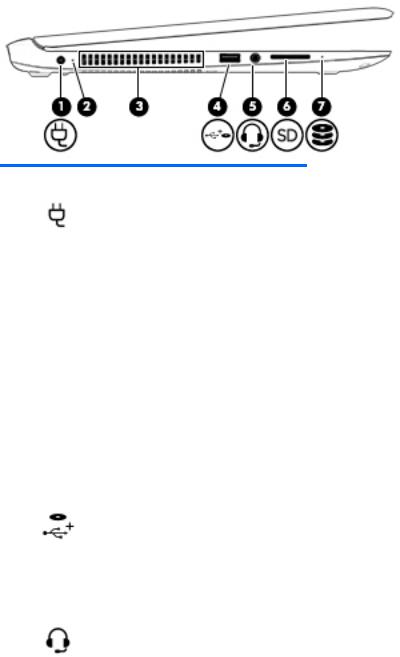
Left
Component |
|
Description |
|
|
|
|
|
(1) |
Power connector |
Connects an AC adapter. |
|
|
|
|
|
(2) |
Battery light |
When AC power is connected: |
|
|
|
● |
White: The battery charge is greater than 90 percent. |
|
|
● |
Amber: The battery charge is from 0 to 90 percent. |
|
|
● |
: The battery is not charging. |
When AC power is disconnected (battery not charging):
● Blinking amber: The battery has reached a low battery level. When the battery has reached a critical battery level, the battery light begins blinking rapidly.
|
|
● |
: The battery is not charging. |
|
|
|
|
(3) |
Vent |
Enables airflow to cool internal components. |
|
|
|
NOTE: The computer fan starts up automatically to cool |
|
|
|
internal components and prevent overheating. It is normal for |
|
|
|
the internal fan to cycle on and o during routine operation. |
|
|
|
|
|
(4) |
USB 2.0 charging (powered) port |
Connects an optional USB device, such as a keyboard, mouse, |
|
|
|
external drive, printer, scanner or USB hub. Standard USB ports |
|
|
|
will not charge all USB devices or will charge using a low current. |
|
|
|
Some USB devices require power and require you to use a |
|
|
|
powered port. |
|
|
|
NOTE: USB charging ports can also charge select models of |
|
|
|
cell phones and MP3 players, even when the computer is o . |
|
|
|
|
|
(5) |
Audio-out (headphone)/Audio-in (microphone) |
Connects optional powered stereo speakers, headphones, |
|
|
combo jack |
earbuds, a headset, or a television audio cable. Also connects an |
|
|
|
optional headset microphone. This jack does not support |
|
|
|
optional microphone-only devices. |
|
Left 7

Component |
|
Description |
|
|
|
|
|
|
|
WARNING! To reduce the risk of personal injury, adjust the |
|
|
|
volume before putting on headphones, earbuds, or a headset. |
|
|
|
For additional safety information, refer to the Regulatory, |
|
|
|
Safety, and Environmental Notices. |
|
|
|
To access this document: |
|
|
|
Windows 7: |
|
|
|
Select Start > All Programs > HP Help and Support > HP |
|
|
|
Documentation. |
|
|
|
Windows 8.1: |
|
|
|
From the Start screen, type support, and then select the HP |
|
|
|
Support Assistant app. |
|
|
|
‒ or – |
|
|
|
From the Windows desktop, click the question mark icon in the |
|
|
|
noti |
cation area, at the far right of the taskbar. |
|
|
Windows 10: |
|
|
|
Select Start, select All apps, select HP Help and Support, and |
|
|
|
then select HP Documentation. |
|
|
|
NOTE: When a device is connected to the jack, the computer |
|
|
|
speakers are disabled. |
|
|
|
|
|
(6) |
Memory card reader |
Reads optional memory cards that store, manage, share, or |
|
|
|
access information. |
|
|
|
|
|
(7) |
Hard drive light |
● |
Blinking white: The hard drive is being accessed. |
|
|
● |
Amber: HP 3D DriveGuard has temporarily parked the hard |
|
|
|
drive. |
|
|
|
|
8Chapter 2 Components

Display
Component |
Description |
|
|
|
|
(1) |
WLAN antennas (2)* (select products only) |
Send and receive wireless signals to communicate with wireless local |
|
|
area networks (WLANs). |
|
|
|
(2) |
WWAN antennas (2)* (select products only) |
Send and receive wireless signals to communicate with wireless wide |
|
|
area networks (WWANs). |
|
|
|
(3) |
Internal microphones (2) |
Record sound. |
|
|
|
(4) |
Webcam light (select products only) |
On: The webcam is in use. |
|
|
|
(5) |
Webcam (select products only) |
Records video and captures photographs. Some models allow you to |
video conference and chat online using streaming video. To use the webcam:
Windows 7: Select Start > All Programs > Communication and Chat
> HP Webcam.
Windows 8.1: Access HP Support Assistant from the Start screen by selecting the HP Support Assistant app.
Display 9
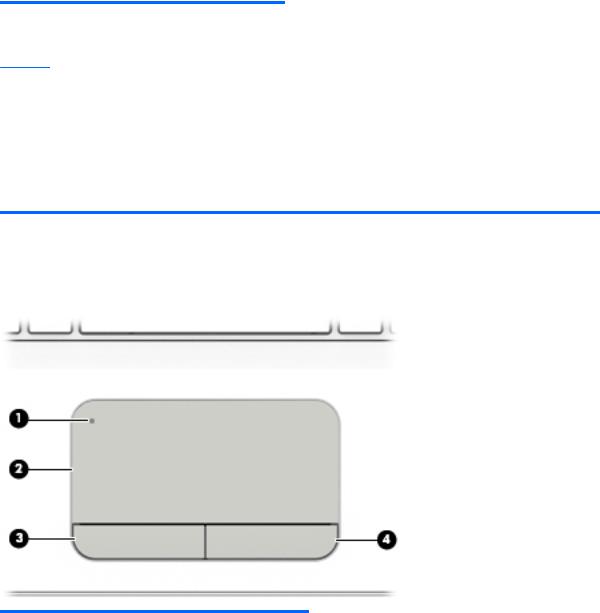
Component |
Description |
|
|
|
Windows 10: Type camera in the taskbar search box, and then |
|
select Camera. |
*The antennas are not visible from the outside of the computer. For optimal transmission, keep the areas immediately around the antennas free from obstructions.
For wireless regulatory notices, see the section of the Regulatory, Safety, and Environmental Notices that applies to your country or region. To access this guide:
Windows 7: Select Start > All Programs > HP Help and Support > HP Documentation.
Windows 8.1: From the Start screen, type support, and then select the HP Support Assistant app.
Windows 10: Select Start, select All apps, select HP Help and Support, and then select HP Documentation.
Top
TouchPad
Component |
|
Description |
|
|
|
(1) |
TouchPad on/o button |
Turns the TouchPad on and o . |
|
|
|
(2) |
TouchPad zone |
Reads your nger gestures to move the pointer or activate |
|
|
items on the screen. |
|
|
|
(3) |
Left TouchPad button |
Functions like the left button on an external mouse. |
|
|
|
(4) |
Right TouchPad button |
Functions like the right button on an external mouse. |
|
|
|
10 Chapter 2 Components

Lights
Component |
|
Description |
|
|
|
|
|
(1) |
Power light |
● |
On: The computer is on. |
|
|
● |
Blinking: The computer is in the Sleep state, a power-saving |
|
|
|
state. The computer shuts o power to the display and |
|
|
|
other unneeded components. |
|
|
● |
: The computer is o or in Hibernation. Hibernation is a |
|
|
|
power-saving state that uses the least amount of power. |
|
|
|
|
(2) |
Caps lock light |
On: Caps lock is on, which switches the key input to all capital |
|
|
|
letters. |
|
|
|
|
|
(3) |
Microphone mute light |
● |
Amber: microphone sound is o . |
|
|
● |
: microphone sound is on. |
|
|
|
|
(4) |
Num lock light |
On: Num lock is on. |
|
|
|
|
|
(5) |
Wireless light |
On: An integrated wireless device, such as a wireless local area |
|
|
|
network (WLAN) device and/or a Bluetooth® device, is on. |
|
|
|
NOTE: On some models, the wireless light is amber when all |
|
|
|
wireless devices are o . |
|
|
|
|
|
(6) |
Mute light |
● |
Amber: Computer sound is o . |
|
|
● |
White: Computer sound is on. |
|
|
|
|
(7) |
TouchPad light |
● |
Amber: The TouchPad is o . |
|
|
● |
: The TouchPad is on. |
|
|
|
|
Top 11
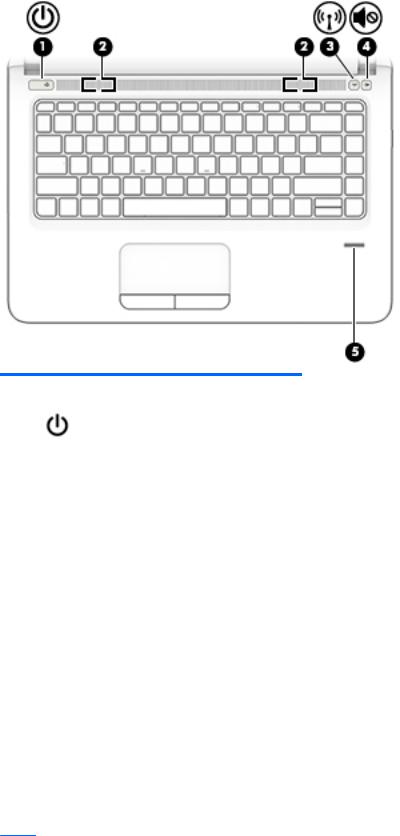
Buttons, speakers, and n erpr nt reader
Component |
|
Description |
|
|
|
|
|
(1) |
Power button |
● |
When the computer is o , press the button to turn on the |
|
|
|
computer. |
|
|
● |
When the computer is on, press the button briefly to initiate |
|
|
|
Sleep. |
|
|
● |
When the computer is in the Sleep state, press the button |
|
|
|
briefly to exit Sleep. |
|
|
● |
When the computer is in Hibernation, press the button |
|
|
|
briefly to exit Hibernation. |
CAUTION: Pressing and holding down the power button results in the loss of unsaved information.
If the computer has stopped responding and shutdown procedures are ine ective, press and hold the power button for at least 5 seconds to turn o the computer.
To learn more about your power settings, see your power options:
Windows 7: Select Start > Control Panel > System and Security
> Power Options.
Windows 8.1: From the Start screen, type power, select Power and sleep settings, and then select Power and sleep from the list of applications.
Windows 10: Type power in the taskbar search box, and then select Power and sleep settings.
– or –
Right-click the Start button, and then select Power Options.
12 Chapter 2 Components

Component |
|
Description |
|
|
|
(2) |
Speakers (2) |
Produce sound. |
|
|
|
(3) |
Wireless button |
Turns the wireless feature on or o but does not establish a |
|
|
wireless connection. |
|
|
A wireless network must be set up before a wireless connection is |
|
|
possible. |
|
|
|
(4) |
Volume mute button |
Mutes and restores speaker sound. |
|
|
|
(5) |
Fingerprint reader (select products only) |
Allows a ngerprint logon to Windows, instead of a password |
|
|
logon. |
|
|
|
Top 13
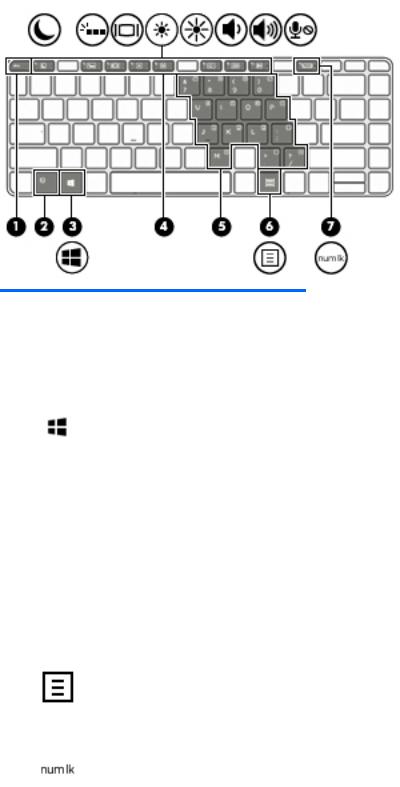
Keys
Component |
|
Description |
|
|
|
(1) |
esc key |
Displays system information when pressed in combination with |
|
|
the fn key. |
|
|
|
(2) |
fn key |
Executes frequently used system functions when pressed in |
|
|
combination with a function key, the num lock key, or the esc |
|
|
key. |
|
|
|
(3) |
Windows key |
Windows 7: Displays the Windows Start menu. |
|
|
Windows 8.1: Returns you to the Start screen from an open app |
|
|
or the Windows desktop. |
|
|
NOTE: Pressing the Windows key again will return you to the |
|
|
previous screen. |
|
|
Windows 10: Opens the Windows Start menu. |
|
|
NOTE: Pressing the Windows key again will close the Start |
|
|
menu. |
|
|
|
(4) |
Function keys |
Execute frequently used system functions when pressed in |
|
|
combination with the fn key. |
|
|
|
(5) |
Embedded numeric keypad |
A numeric keypad superimposed over the keyboard alphabet |
|
|
keys that enables you to add, subtract, and perform other |
|
|
numeric tasks. When num lock is on, the keypad can be used like |
|
|
an external numeric keypad. |
|
|
|
(6) |
Windows application key |
Windows 7: Displays a shortcut menu for items beneath the |
|
|
cursor. |
|
|
Windows 8.1: Displays options for a selected object. |
|
|
Windows 10: Displays options for a selected object. |
|
|
|
(7) |
num lock key |
Turns the embedded numeric keypad on and o . |
|
|
|
14 Chapter 2 Components
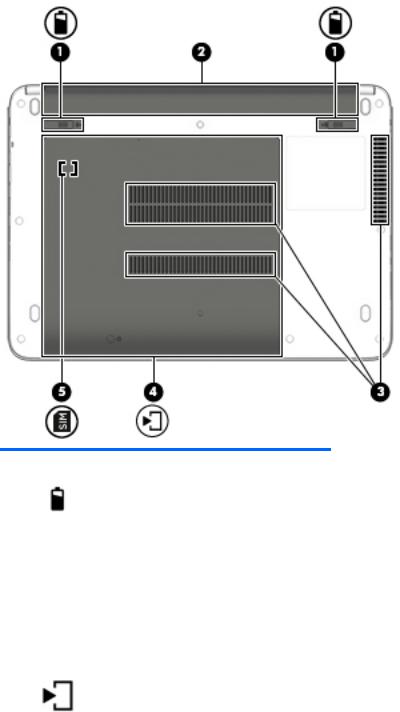
Bottom
Component |
|
Description |
|
|
|
(1) |
Battery release latches (2) |
Release the battery. |
|
|
|
(2) |
Battery bay |
Holds the battery. |
|
|
|
(3) |
Vents (3) |
Enable airflow to cool internal components. |
|
|
NOTE: The computer fan starts up automatically to cool |
|
|
internal components and prevent overheating. It is normal |
|
|
for the internal fan to cycle on and o during routine |
|
|
operation. |
|
|
NOTE: The vents shown in this illustration may vary |
|
|
depending on your computer model. |
|
|
|
(4) |
Service door |
Provides access to the hard drive bay, the wireless LAN |
|
|
(WLAN) module slot, the WWAN module slot, the SIM |
|
|
connector, and the memory module slots. |
Bottom 15

Component |
|
Description |
|
|
|
|
|
CAUTION: To prevent an unresponsive system, replace |
|
|
the wireless module only with a wireless module |
|
|
authorized for use in the computer by the governmental |
|
|
agency that regulates wireless devices in your country or |
|
|
region. If you replace the module and then receive a |
|
|
warning message, remove the module to restore computer |
|
|
functionality, and then contact support. |
|
|
To access Help and Support in Windows 7: Select Start > |
|
|
Help and Support. |
|
|
To access HP Support Assistant: in Windows 8.1: From the |
|
|
Start screen, select the HP Support Assistant app. |
|
|
Windows 10: |
|
|
Type support in the taskbar search box, and then select |
|
|
the HP Support Assistant app. |
|
|
- or - |
|
|
Click the question mark icon in the taskbar. |
|
|
|
(5) |
SIM connector |
Supports a wireless subscriber identity module (SIM). The |
|
|
SIM connector is located under the service door. |
|
|
|
16 Chapter 2 Components
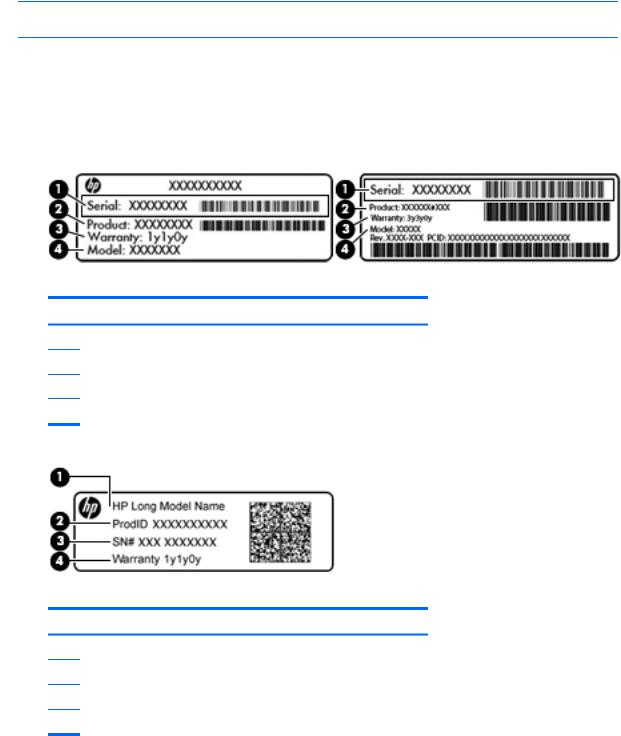
Labels
The labels affixed to the computer provide information you may need when you troubleshoot system problems or travel internationally with the computer.
 IMPORTANT: Check the following locations for the labels described in this section: the bottom of the computer, inside the battery bay, under the service door, or on the back of the display.
IMPORTANT: Check the following locations for the labels described in this section: the bottom of the computer, inside the battery bay, under the service door, or on the back of the display.
●Service label—Provides important information to identify your computer. When contacting support, you will probably be asked for the serial number, and possibly for the product number or the model number. Locate these numbers before you contact support.
Your service label will resemble one of the examples shown below. Refer to the illustration that most closely matches the service label on your computer.
Component
(1)Serial number
(2)Product number
(3)Warranty period
(4)Model number (select products only)
Component
(1)Model name (select products only)
(2)Product number
(3)Serial number
(4)Warranty period
●Regulatory label(s)—Provide(s) regulatory information about the computer.
●Wireless certi cation label(s)—Provide(s) information about optional wireless devices and the approval markings for the countries or regions in which the devices have been approved for use.
Labels 17
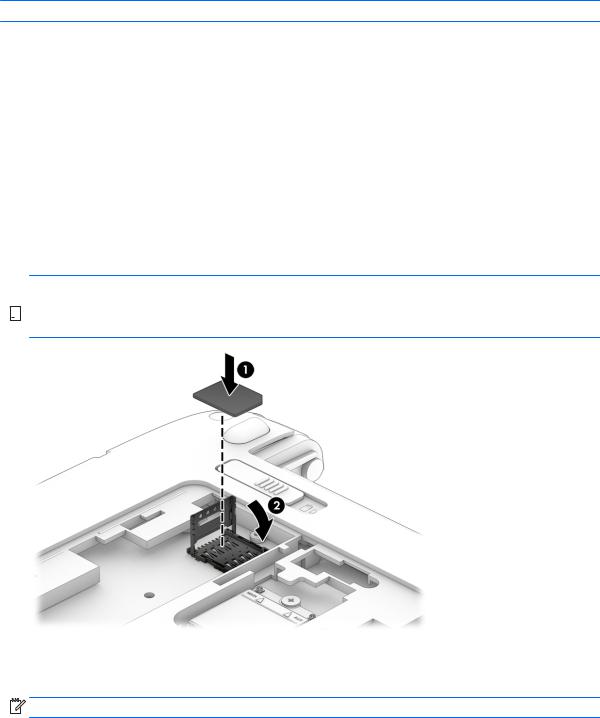
Inserting a SIM card (select products only)
 CAUTION: To prevent damage to the connectors, use minimal force when inserting a SIM card.
CAUTION: To prevent damage to the connectors, use minimal force when inserting a SIM card.
To insert a SIM card, follow these steps:
1.Turn o the computer by using the Shut down command.
2.Close the display.
3.Disconnect all external devices connected to the computer.
4.Unplug the power cord from the AC outlet.
5.Turn the computer upside down on a flat surface, with the battery bay toward you.
6.Remove the battery.
7.Remove the service door.
8.Insert the SIM card (1) into the SIM locking hinged connector, and gently push the SIM card until it is rmly seated. Rotate the hinge (2) down to secure the SIM card into the connector.
 NOTE: The SIM card in your computer may look slightly di erent from the illustration in this section.
NOTE: The SIM card in your computer may look slightly di erent from the illustration in this section.


 NOTE: See the image in the service bay to determine which way the SIM card should be inserted into your computer.
NOTE: See the image in the service bay to determine which way the SIM card should be inserted into your computer.
9.Replace the service door.
10.Replace the battery.


 NOTE: HP Mobile Broadband will be disabled if the battery is not replaced.
NOTE: HP Mobile Broadband will be disabled if the battery is not replaced.
11.Reconnect external power.
12.Reconnect external devices.
13.Turn on the computer.
To remove a SIM card, rotate the SIM connector hinge upward, and then remove the SIM card from the connector.
18 Chapter 2 Components
